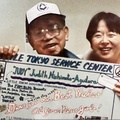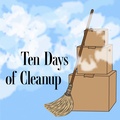Jamie Kaneko carefully counts out fifteen sheets of toilet paper on her roll, tears on the perforated line, and hands the loose end to me with a smile. “Here you go—now don’t start until I tell you to.”
A couple of young teenagers, holding their toilet paper tails with the tips of their fingers, giggle, while the grandmothers on the couch look a bit confused. The rest of us—veteranos—sit politely, but inside I feel like screaming—like, for once, can’t someone think of anything different—
Jamie raises her arms and then dramatically swishes them down like she was starting a NASCAR race. “Okay, go!” she screams. Krista, the most competitive one of us all (she had already won the trivia contest and the don’t-cross-your legs game), is madly looping and fluffing her line of toilet paper—if she had access to a whole Costco-sized package of toilet paper rolls, I have no doubt that she could have knitted a winter coat in record time. The grandmothers use their crafting skills to make some interesting and precise knots, while the teenagers and baby-boomer aunts are hopeless.
“Caroline, c’mon, you have to do something.” Jamie stands over me, her hand on her hip, a typical middle-school teacher stance. (Yeah, well, how about a toilet-paper noose, I start thinking.) Jamie is taking her matron-of-honor duties seriously, and that’s precisely why she wasn’t my best friend Ginnie Lee’s first choice. But I cannot be moved, cajoled, guilted, or even bribed—although the dinner at Mori Sushi on Wilshire was pretty tempting. But I hold strong. “You know my rule—no maid of honor, no bridesmaid, nothing with maid in the job description! I’ll be your troubleshooter, your slave for the day, your personal gofer, but nothing that involves taffeta, satin, or being nice!”
“But you’re my best friend,” Ginnie said.
“And I’ll keep being your best friend,” I replied, desperately hoping that it would be true. But the two of us had been the last of the singletons in our circle of girlfriends. We had already gone to a couple of baby showers during the past year and I can see the line of them on my horizon—toilet-paper veils to be replaced by the guess-the-chocolate-in-the-diapers game. “Besides, you know with my job, I’ll just be letting you down.”
I have spent the last six years at Humphreys Private Bank, the most I’ve ever been with the same company. I went from human resources assistant to human resources director. I have a super-spidey sense in matching people to jobs or even each other. I had been the one who actually suggested Ginnie’s fiancé, Matt, as a prospective love interest to her even though she currently denies it.
Actually almost all of my married match-ups don’t acknowledge me as the one who had orchestrated their union, because who am I? A singleton who hasn’t been in a serious relationship for seven years, an old maid at 37, a career woman. So I supposedly have no clue about love? To me, it is so basic—just do a personality assessment, background and financial check, look into their referrals and past jobs (well, relationships), see what organizations and activities that they are involved in. Once all this information is processed and analyzed, wha-la, a proper match can be made. It works. I have a 15 to 3 track record, even though the players don’t give me my props.
“If you’re so good,” a critic once said to me. “Why haven’t you found a guy for yourself?”
The answer is simple: I’m not interested. Too busy. I seriously cannot be bothered. I like coming home to my new condominium in Pasadena, eating out of a Chinese takeout box in front of my plasma television, watching “America’s Top Model” or “Gossip Girl.” I like not having to compromise or cater to anyone but myself.
“Okay, time’s up!” Krista screeches, a digital camera in her hands. “Let’s take turns seeing your veils on Ginnie. I’ll take the pictures!”
Ginnie grins weakly at me and I wince. Games that a bride-to-be has to play.
***
I somehow survive Sunday’s shower. In fact, I’m sorry to see it end, because that means tomorrow is Monday. Back to work. Normally I cannot wait until Monday. I love the routine of the work week—getting up at a certain time, scheduled meetings, coffee and lunch breaks with the same set of colleagues. But work’s been a bit stressful lately. We’ve had our share of layoffs and it’s my job to consult with department managers on the best way to communicate how to let people go. I have a feeling that another round of layoffs is on its way.
So when I get a text message for me to report to one of our senior vice presidents first thing in the morning, I’m not surprised. It’s with the v.p. that we in the rest of the company refer to as Hatchetman because he’s the one who always seems to deliver the bad news.
“Caroline, please sit,” he tells me.
I take a seat at the conference table, but he insists that I sit in the plush leather chair on the other side of his desk. I know that having me sit in that chair is a power play, to let the sitter know who’s in charge. I wonder why he’s making the move on me. I’m just the messenger.
“You know that we’ve had to streamline things in light of the economy,” Hatchetman says.
I nod my head. Streamline, it’s one of those innocuous words we’ve learned in the field. What department will it be, I wonder? Small business loans? Relationship department?
“We’ll be dissolving the human resources department.”
Hatchetman’s voice begins to get distorted like the adults on Peanuts television specials. Is he speaking another language? I see his mouth moving, but I can’t make out the words.
“Wait a minute—” I say. “Am I being fired?” All these other euphemisms that we are taught in human resources to say which I’ve used recently—laid off, downsized, minimized, eliminated—fly by in my head.
“Yes, Caroline, yes you are.” Hatchetman is finally understandable.
And for some reason I start to laugh. First a few private chuckles, a couple of ha-has, and then side-splitting laughter, the kind that squeezes tears from your eyes.
“Are you alright?”
I think back to my recent meetings with employees who were about to get the axe—their watering, shifting eyes, legs practically bouncing up and down from the floor.
“I said, Ms. Mameda, are you alright?”
The only thing that comes to my mind is, I’m getting what I deserve.
***
There are different methods to release a discharged employee. You can give them two weeks’ notice—give them time to get their bearings and maybe start to look for something else. That method has its risks because vindictive employees who stay on can possibly “poison the waters”—you know, talk bad about the company to ones that are remaining, steal confidential files, sometimes even vandalize property. The most extreme method is to have the discharged employee leave immediately after notification with an escort—no time provided to even pack their personals.
Hatchetman opted for the latter. As a human resource professional, I would have made the same call. My staff would be called in right after me and they would be following in my footsteps, down the elevator with an escort, the security guard who smiled and called me, “Miss Powerhouse,” every morning. I ached for each one of them. They had worked hard for the company and hard for me as well.
As I sat in my regular seat on the Gold Line light rail, returning to Pasadena about eight hours earlier than I normally do, I recycled the information Hatchetman had told me. The standard severance plan. One week for every year I worked there. So seven weeks. Medical insurance would go into a Cobra, renewable if I maintained monthly payments, etcetera.
And then it hit me. OhmyGod. My big fat mortgage. Due in a couple of weeks. It took half of my paycheck so that meant two of the seven weeks of severance pay. And then a month later, I’d have to come up with another payment. Unemployment would be only enough for the Cobra and maybe my groceries. I see all the incidentals—cable, eating out, going to movies, clothes—melting away.
As soon as I’m off the train, I go into the open courtyard of the station and call Ginnie on my cell phone. I tell her everything, even the part that she’s heard a hundred times before. How my parents and brother and sister always thought of me as the “troubled” one, the one who wasn’t in step with the rest of the family. How they were shocked when I started doing well in my work. And even greater shock when I bought my condo with no financial help from my parents.
And now everything that they had predicted for me was coming true. I was out of work with no husband or children. And a step from being homeless.
“Oh, Bean,” Ginnie says my nickname, based on part of my last name Mameda. “What are you going to do?”
* "Baishakunin, Inc." is a work of fiction. The characters, incidents, and dialogue are drawn from the author’s imagination and are not to be construed as real. Any resemblance to actual events or persons, living or dead, is entirely coincidental.
© 2008 Naomi Hirahara / Image: Neal Yamamoto and Vicky K. Murakami-Tsuda





